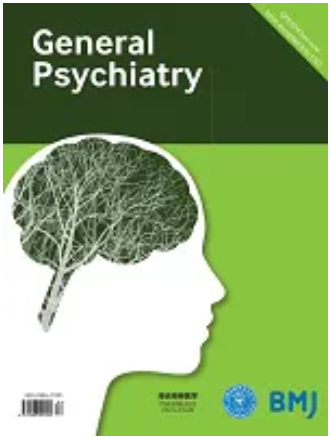Dissecting the association between gut microbiota, body mass index and specific depressive symptoms: a mediation Mendelian randomisation study
IF 6.8
3区 医学
Q1 PSYCHIATRY
引用次数: 0
Abstract
Background Observational studies highlight the association between gut microbiota (GM) composition and depression; however, evidence for the causal relationship between GM and specific depressive symptoms remains lacking. Aims We aimed to evaluate the causal relationship between GM and specific depressive symptoms as well as the mediating role of body mass index (BMI). Methods We performed a two-sample Mendelian randomisation (MR) analysis using genetic variants associated with GM and specific depressive symptoms from genome-wide association studies. The mediating role of BMI was subsequently explored using mediation analysis via two-step MR. Results MR evidence suggested the Bifidobacterium genus (β=–0.03; 95% CI –0.05 to –0.02; p<0.001 and β=–0.03; 95% CI –0.05 to –0.02; p<0.001) and Actinobacteria phylum (β=–0.04; 95% CI –0.06 to –0.02; p<0.001 and β=–0.03; 95% CI –0.05 to –0.03; p=0.001) had protective effects on both anhedonia and depressed mood. The Actinobacteria phylum also had protective effects on appetite changes (β=–0.04; 95% CI –0.06 to –0.01; p=0.005), while the Family XI had an antiprotective effect (β=0.03; 95% CI 0.01 to 0.04; p<0.001). The Bifidobacteriaceae family (β=–0.01; 95% CI –0.02 to –0.01; p=0.001) and Actinobacteria phylum (β=–0.02; 95% CI –0.03 to –0.01; p=0.001) showed protective effects against suicidality. The two-step MR analysis revealed that BMI also acted as a mediating moderator between the Actinobacteria phylum and appetite changes (mediated proportion, 34.42%) and that BMI partially mediated the effect of the Bifidobacterium genus (14.14% and 8.05%) and Actinobacteria phylum (13.10% and 8.31%) on both anhedonia and depressed mood. Conclusions These findings suggest a potential therapeutic effect of Actinobacteria and Bifidobacterium on both depression and obesity. Further studies are required to translate these findings into clinical practice. Data are available in a public, open access repository. All GWAS summary statistics are publicly available for download. The GWASs data for gut microbiota were provided by MiBioGen consortium (剖析肠道微生物群、体重指数和特定抑郁症状之间的关联:调解孟德尔随机研究
背景 观察性研究强调了肠道微生物群(GM)组成与抑郁症之间的关系;然而,仍然缺乏证据证明肠道微生物群与特定抑郁症状之间的因果关系。目的 我们旨在评估肠道微生物群与特定抑郁症状之间的因果关系以及体重指数(BMI)的中介作用。方法 我们利用全基因组关联研究中与基因改造和特定抑郁症状相关的基因变异进行了双样本孟德尔随机化(MR)分析。随后,通过两步 MR 的中介分析探讨了 BMI 的中介作用。结果 MR 证据表明双歧杆菌属(β=-0.03;95% CI -0.05 至 -0.02;p)。特定抑郁症状的 GWASs 数据来自英国生物库(UK Biobank)。BMI 的 GWASs 由 GIANT 联合体提供([https://portals.broadinstitute.org/collaboration/giant/index.php/GIANT\_consortium\_data_files][1])。[1]: https://portals.broadinstitute.org/collaboration/giant/index.php/GIANT_consortium_data_files
本文章由计算机程序翻译,如有差异,请以英文原文为准。
求助全文
约1分钟内获得全文
求助全文
来源期刊

General Psychiatry
医学-精神病学
CiteScore
21.90
自引率
2.50%
发文量
848
期刊介绍:
General Psychiatry (GPSYCH), an open-access journal established in 1959, has been a pioneer in disseminating leading psychiatry research. Addressing a global audience of psychiatrists and mental health professionals, the journal covers diverse topics and publishes original research, systematic reviews, meta-analyses, forums on topical issues, case reports, research methods in psychiatry, and a distinctive section on 'Biostatistics in Psychiatry'. The scope includes original articles on basic research, clinical research, community-based studies, and ecological studies, encompassing a broad spectrum of psychiatric interests.
 求助内容:
求助内容: 应助结果提醒方式:
应助结果提醒方式:


